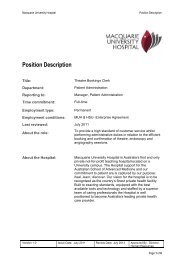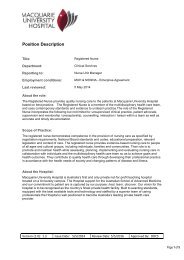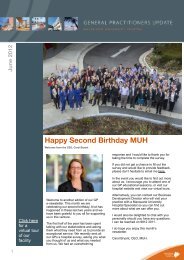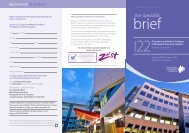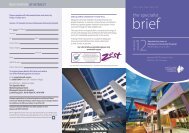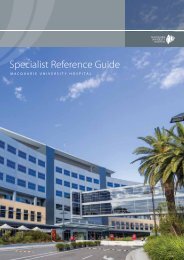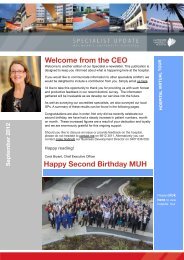Plenary Oral Presentations - Macquarie University Hospital
Plenary Oral Presentations - Macquarie University Hospital
Plenary Oral Presentations - Macquarie University Hospital
Create successful ePaper yourself
Turn your PDF publications into a flip-book with our unique Google optimized e-Paper software.
16 th International Meeting of the Leksell Gamma Knife ® SocietyMarch 2012, Sydney, AustraliaMA-183Gamma knife radiosurgery for brain metastases fromgastrointestinal tract cancersTakuya Kawabe, Masaaki Yamamoto, Bierta E Barfod, Yoichi UrakawaKatsuta <strong>Hospital</strong> Mito GammaHouse, Hitachi-naka, JapanObjective: Brain metastases (METs) from gastrointestinal (GI) tract cancers are relatively uncommon.We evaluated the efficacy of Gamma Knife radiosurgery (GKRS) for brain METs from GI tract cancers.Methods: Among our consecutive series of 2,550 patients who underwent GKRS for brain METs atthe Katsuta <strong>Hospital</strong> Mito GammaHouse during the 13-year period from July 1998 to July 2011,301 (11.8%) patients (92 women, 209 men, mean age; 65 [range; 25-88] years) with METs from GItract cancers were selected for this study. The most common primary tumor site was the colon (101patients) followed by the rectum (96), stomach (66), esophagus (39), duodenum (three) and smallintestine (two). Mean and median lesion numbers were 4 and 2, respectively, range 1-37. The medianvolume of the largest tumors was 6.7 (range; 0.02-55.6) cc, and the median peripheral dose was 20(range; 10-25) Gy. The median period between original cancer diagnosis and brain MET occurrencewas 23 (range; 0- 237) months. The median KPS at the time of GKRS was 80% (range 40-100%).Results: The median survival time (MST) was 5.1 months overall. MSTs according to RecursivePartitioning Analysis (RPA) were 16.9 months in Class 1 (7 patients), 5.7 in Class 2 (255) and 2.2in Class 3 (39). Single metastasis, better KPS, synchronous metastasis and well-controlled primarytumors were significant factors favoring survival. Neurological survival and qualitative survivalwere 94% and 83% at the 6th post-GKRS month and 90% and 70% at the12th post-GKRS month.Follow-up imaging studies were available in 185 patients (61%). The tumor control rates and newlesion-free survival rates per patient were 84% and 45% at the 6th and 69% and 34% at the12thpost-GKRS month.Conclusions: Our present results suggest GKRS to be effective for GI tract cancer brain MET patientsof RPA classes 1 and 2.46



